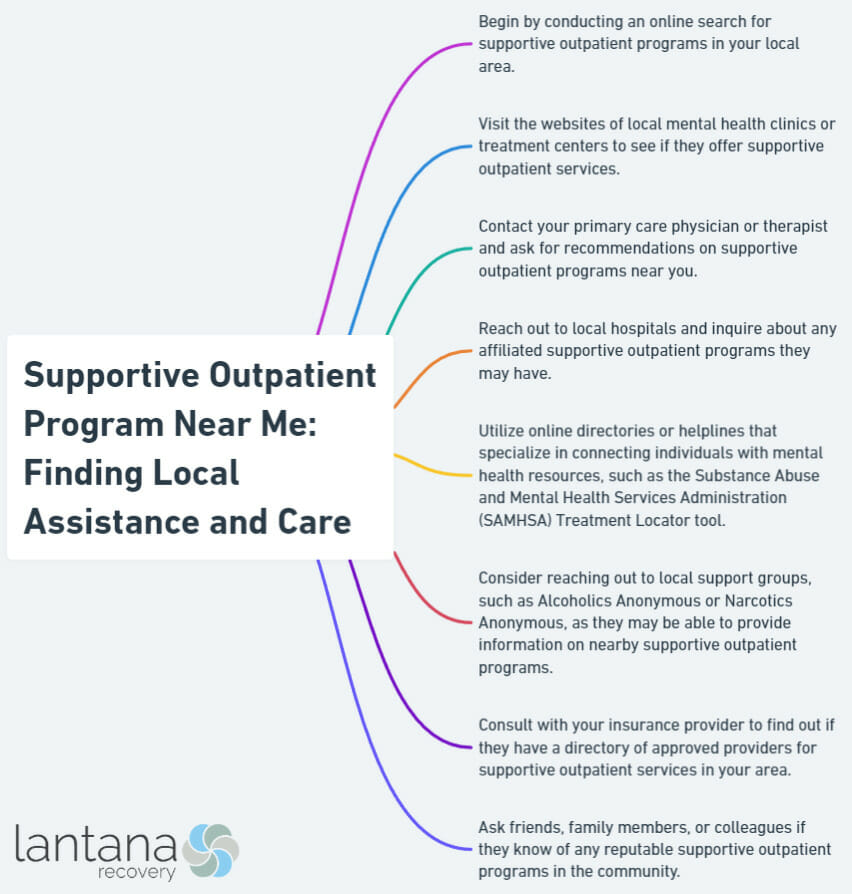Supportive outpatient programs play a crucial role in providing assistance and care for individuals seeking support and guidance during their recovery journey. These programs offer structured treatment and support services on an outpatient basis, allowing individuals to receive the help they need while still maintaining their daily routines and responsibilities.
Understanding the concept of a supportive outpatient program is essential in recognizing the benefits it can provide. These programs typically offer a combination of therapy, counseling, medication management, and support groups to address the specific needs of individuals seeking assistance. They focus on fostering personal growth, developing coping mechanisms, and enhancing overall well-being.
When it comes to finding local assistance and care, opting for a program in your community can be highly beneficial. Local support ensures that individuals have access to services conveniently and can easily engage in face-to-face interactions with healthcare professionals and peers. This proximity promotes a sense of belonging, understanding, and connection during the recovery process.
There are several advantages to seeking local assistance. Firstly, it allows for a stronger support network, as individuals can easily connect with others who may share similar experiences and challenges. local programs often have a better understanding of the community’s unique needs, providing more targeted and tailored support. Local assistance also eases the logistics of attending appointments, reducing travel time and expenses.
Finding a supportive outpatient program near you can be done through various methods. Online searches can provide a list of available programs in your area, while local directories and listings offer comprehensive information on services and contact details. Referrals from healthcare providers, such as doctors or therapists, can guide you to reputable programs. Furthermore, recommendations from support groups or peers who have gone through similar experiences can provide valuable insights and suggestions.
Selecting the right supportive outpatient program requires careful consideration. Factors to prioritize include the specific services offered, the expertise and qualifications of the program’s staff, the location’s accessibility, and the availability of insurance coverage or affordable payment options. Taking these factors into account ensures that individuals receive the most suitable and effective support during their recovery journey.
Engaging in a supportive outpatient program can bring numerous benefits and have a significant impact on individuals’ lives. These programs often provide individualized treatment and support tailored to meet each person’s unique needs. Continuity of care ensures that individuals receive ongoing support and guidance throughout their recovery process. Community and peer support offer a sense of camaraderie and understanding, fostering an environment of empathy and encouragement. Lastly, a holistic approach to recovery addresses not only the physical aspects but also the mental, emotional, and social dimensions of well-being.

What is a Supportive Outpatient Program?
A supportive outpatient program can be a game-changer when it comes to finding local assistance and care. Starting an intensive outpatient program is a commitment, but what exactly is it? In this section, we’ll dive into the concept and explore how these programs provide a much-needed lifeline for individuals in need. So, get ready to uncover the ins and outs of supportive outpatient programs and how they can transform lives. Let’s leave no stone unturned as we embark on this enlightening journey.
Understanding the Concept
Understanding the concept of a supportive outpatient program is crucial. It allows individuals to receive treatment and support while living at home and attending therapy sessions on an outpatient basis. This approach offers flexibility and convenience for ongoing treatment without 24/7 supervision. Compared to residential programs, supportive outpatient programs allow individuals to maintain their daily routines and responsibilities.
Supportive outpatient programs focus on physical, emotional, and mental well-being. They offer individual therapy, group therapy, medication management, and educational workshops. When choosing a program, consider the services offered, staff expertise, location, and accessibility.
These programs aim to enhance overall well-being and cultivate proficiency in managing mental health conditions, addiction recovery, and other challenges. They provide individualized treatment and support tailored to each person’s needs. Additionally, these programs emphasize continuity of care by offering ongoing support and monitoring.
Supportive outpatient programs also emphasize community and peer support. This fosters a sense of belonging and connection with others who have similar experiences. Seeking local assistance and care becomes easier with an understanding of these programs.
Importance of Finding Local Assistance and Care
Finding local assistance and care is crucial in outpatient programs. The significance of this lies in the fact that it enables individuals to conveniently access help without the need to travel long distances. By having access to services close to their homes, people can ensure regular attendance at appointments, therapy sessions, and support groups, thereby reducing the stress associated with lengthy commutes.
Apart from the convenience factor, local assistance and care also contribute to the development of a strong sense of community. When individuals connect with others who are going through similar situations, it has a positive impact on their overall well-being. By sharing their experiences and receiving support from local resources, individuals can gain a better understanding of their own recovery journey and feel supported during the process.
Moreover, finding local assistance also offers the advantage of receiving specialized services and expertise that are tailored to specific challenges and cultural considerations. Local providers understand the needs of the community they serve and can effectively address them.
Why is Local Support Important?
Local support is important for several reasons. One key reason is accessibility. Local support makes it easy to get help quickly when you need it. By reaching out to a local program, you can receive immediate assistance and make a significant difference in your recovery journey.
Another important aspect of local support is familiarity with the community. Local support programs understand the challenges and resources available in your specific community. They are well acquainted with the unique needs and cultural factors that may affect your recovery journey.
Continuity of care is also a crucial benefit of local support. With local programs, you can experience smooth transitions in care, such as moving from inpatient treatment to outpatient support. This ensures that you maintain progress and lowers the risk of relapse.
Community involvement is another advantage of local support. Local programs collaborate with community organizations and support groups, providing additional resources and a network of individuals who can empathize with your struggles.
What are the Benefits of Local Assistance?
Local assistance offers numerous benefits for individuals seeking outpatient support. One of the major advantages is the accessibility and timeliness of help. With local assistance, individuals can easily access treatment without experiencing any delays, ensuring a prompt response to emergencies or urgent situations.
Additionally, local assistance programs have a deep familiarity with the community. They are well-versed in the available resources, infrastructure, and cultural nuances of the area. This enables them to tailor their services to meet the specific needs of individuals, resulting in more effective support.
Another significant benefit of local assistance programs is the enhanced coordination of care. They have established connections with other healthcare providers and community organizations, allowing for seamless coordination of treatment and support. This ensures that individuals receive comprehensive care, improving their overall well-being.
Moreover, local assistance programs provide opportunities for peer support and community engagement. By connecting with others facing similar challenges, individuals can experience a sense of belonging and reduce feelings of isolation. This engagement promotes their overall well-being and supports their recovery journey.
Furthermore, local assistance programs adopt a holistic approach to recovery. They address not only the physical aspects but also the emotional, social, and spiritual dimensions of well-being. This comprehensive approach leads to more sustainable and long-lasting recovery outcomes.
By opting for local assistance, individuals can access personalized treatment and support systems that are rooted in the unique context of their communities. This significantly enhances their recovery journey and equips them with the necessary tools and resources to achieve lasting positive change.
How to Find a Supportive Outpatient Program Near Me
Are you seeking a supportive outpatient program near you but not sure where to start? Let’s explore some effective methods that can assist you in finding the right program. From conducting online searches to utilizing local directories and listings, we’ll uncover various avenues to explore. Additionally, we’ll discuss the value of referrals from healthcare providers and recommendations from support groups or peers. By the end, you’ll have the tools and resources to find the supportive outpatient program that best suits your needs and location.
1. Online Search
To find a supportive outpatient program near you, it is important to conduct an online search using search engines. These online search engines require suitable search terms to ensure accurate results. Therefore, make sure to use relevant keywords related to your location and the type of program you are seeking.
Your search query must have the type of addiction treatment program you are looking for as well as your location. For example, if you are a resident of South Carolina, you can type the phrase drug rehab South Carolina to get the desired results.
Once you have the search results, it is recommended to click on the websites listed to gather more details about the available programs. Look for websites of reputable organizations, treatment centers, or government agencies that specialize in addiction or mental health.
When exploring the websites of supportive outpatient programs, pay attention to the program details. This includes learning about their services, treatment approaches, and qualifications. Take note of the programs that align with your needs and preferences.
Verification of the legitimacy and credibility of the programs is crucial. Look for certifications, licenses, or accreditation from relevant authorities online. Additionally, reading reviews and testimonials from previous clients can give you valuable insights.
Take note of the contact information provided on the websites, such as phone numbers or email addresses, for the programs that interest you. This will enable you to reach out and gather more information or schedule appointments.
A pro tip is to narrow down your search results by including specific details, such as your city or state, and the type of treatment you require. This will help you find more relevant and localized options in your area.
2. Local Directories and Listings
Local directories and listings are helpful strategies when searching for a supportive outpatient program in your area. Here are some reasons why:
- Convenience: Local directories and listings provide an easy way to find nearby programs. You can access information about different programs in your area without extensive searching.
- Specificity: Local directories and listings include detailed information about each program, such as location, contact details, and services offered. This helps you find programs that meet your specific needs.
- Comparisons: By using local directories and listings, you can compare multiple programs side by side. This allows you to evaluate the options available and make an informed decision based on your preferences and requirements.
- Availability: Local directories and listings include programs that are readily available in your community. This ensures easy access to the support and care you need without long-distance travel.
As extra health care health services that enhance support and assistance for better health, using local directories and listings streamlines the process of finding a supportive outpatient program near you, providing convenience, specificity, comparison, and availability.
3. Referrals from Healthcare Providers
When searching for an outpatient program, referrals from healthcare providers can be incredibly helpful. Here’s why:
1. Expertise: Healthcare providers possess vast knowledge about various treatment options and can offer valuable insights into reputable and effective programs.
2. Credibility: Referrals from healthcare providers hold immense credibility, instilling confidence in the chosen program. These professionals understand your medical history and can recommend programs that specifically cater to your needs.
3. Access to specialized services: Healthcare providers can connect you with outpatient programs that offer specialized services, such as mental health support, addiction treatment, or chronic pain management.
4. Continuity of care: By receiving a referral from your healthcare provider, you ensure seamless continuity of care. The chosen program will have access to your medical records and collaborate with your healthcare provider to create a personalized treatment plan.
If you are considering an outpatient program, it is crucial to engage in a discussion with your healthcare provider. They can provide tailored recommendations and assist you in making an informed decision.
4. Recommendations from Support Groups or Peers
When looking for a supportive outpatient program, it is important to consider recommendations from support groups or peers. These individuals can offer valuable insights and recommendations based on their own experiences with recovery. Seeking peer support can provide firsthand knowledge of different programs and their effectiveness, while support groups can share their collective experiences and offer recommendations. For instance, managed alcohol programs (MAPs) have demonstrated encouraging outcomes in mitigating alcohol-related damages as explored in This place has given me a reason to care by Evans et al., 2015.
Additionally, online forums and communities dedicated to mental health and recovery can provide a wealth of information and diverse perspectives. Therapists or counselors who specialize in addiction or mental health can also provide valuable input and guidance. By gathering recommendations from support groups or peers, individuals can make informed decisions and increase the chances of finding a supportive outpatient program that suits their needs and leads to a successful recovery journey.

Key Factors to Consider When Choosing a Supportive Outpatient Program
When it comes to choosing a supportive outpatient program, there are crucial factors that can make all the difference. From the services offered to the expertise and qualifications of the providers, the location and accessibility, and even the insurance coverage, each aspect holds vital importance in finding the right program. In this section, we will delve into these key factors, providing you with valuable insights to help you make an informed decision. So, let’s dive in and explore what each sub-section has to offer.
1. Services Offered
When selecting an outpatient program, it is important to take into consideration the variety of services offered. There are several key factors that should be considered, including:
1. Individual therapy: Many programs provide personal sessions with licensed therapists who can address your specific needs and challenges.
2. Group therapy: These programs allow you to connect with others who are facing similar issues, providing a supportive and encouraging community.
3. Psychoeducation: Sessions focusing on topics such as stress management and self-care can help you gain a greater understanding of mental health and develop coping skills.
4. Medication management: If you require medication as part of your treatment plan, outpatient programs often have psychiatrists or psychiatric nurse practitioners who can assist with medication management.
Pro-tip: Before making a decision, it is recommended to create a list of important addiction recovery services that align with your needs and goals, ensuring that you select a program that best suits you.
2. Expertise and Qualifications
Choosing a supportive outpatient program requires considering the expertise and qualifications of the program. This ensures that you receive high-quality care from knowledgeable professionals who specialize in your specific needs.
The program needs mental health and addiction treatment specialists. Experts should have advanced degrees and certifications, such as psychiatrists, psychologists, licensed therapists, and addiction counselors:
- Inquire about the professionals’ experience and years of practice. More experience equips professionals to handle various situations and provide effective treatment.
- Look for a program with a track record of success in achieving recovery and long-term sobriety. Programs with positive testimonials and high success rates are preferred.
- Program qualifications should align with evidence-based practices and treatment methods. Make sure the program uses evidence-based practices and stays updated with the latest research.
- Consider additional certifications or specialized training for the program or its staff. Staff members may have certifications in trauma-informed care, dual diagnosis treatment, or specific therapeutic approaches.
Choosing a supportive outpatient program with the right expertise and qualifications gives you confidence in receiving the best possible care and increases your chances of lasting recovery.
3. Location and Accessibility
When considering a supportive outpatient program, it is important to take into account the location and accessibility. Here are some key points to remember in this regard:
1. Proximity: It is advisable to choose a program that is near your home, workplace, or school. This will make it easier for you to attend appointments regularly.
2. Transportation options: Make sure to check for nearby public transportation or parking facilities. It is important that the program is easily accessible by bus or train.
3. Accessibility for individuals with disabilities: It is crucial to confirm if the program has wheelchair accessibility and provides accommodations for people with mobility issues.
4. Environment: If possible, visit the program location to ensure that it provides a safe and comfortable environment where you feel supported.
5. Operating hours: Take into consideration the program’s hours of operation and choose one that aligns with your schedule.
For instance, John was searching for a supportive outpatient program for his addiction recovery. He discovered one that was near his workplace, which allowed him to attend sessions during his lunch breaks. Additionally, this program was wheelchair accessible and offered evening sessions, which accommodated his work hours. The location and accessibility of the program played a significant role in John’s decision and ultimately contributed to his successful recovery journey.
4. Insurance Coverage
When considering a supportive outpatient program, it is important to evaluate your insurance coverage. There are several key factors to consider when it comes to insurance coverage:
- Network coverage: It is essential to check if the program you are considering is within your insurance network. This will ensure that you receive maximum coverage and minimize out-of-pocket expenses.
- Covered services: Take the time to review the specific services that are covered by your insurance plan. It is important to determine if the program aligns with your treatment needs and goals.
- Co-pays and deductibles: Understanding your financial responsibilities, such as co-pays and deductibles, is crucial when participating in an outpatient program. This knowledge will help you plan your budget accordingly.
- Out-of-network options: There may be instances where an out-of-network program is the best fit for you. In such cases, it is important to assess the coverage for out-of-network services and determine your comfort level with potential additional costs.
Insurance coverage plays a significant role in your accessibility to a supportive outpatient program and the overall cost of treatment. It is vital to carefully review and understand your insurance policy in order to make an informed decision.
In the past, insurance coverage for mental health and addiction treatment has not always been comprehensive. However, there has been a positive shift towards better coverage and recognition of the importance of mental health care. Many insurance plans now offer more extensive coverage for supportive outpatient programs, making it easier for individuals to access necessary care without facing significant financial burdens. To gain a clear understanding of the specifics of your coverage and to be well informed about your options, it is recommended that you reach out to your insurance provider directly.

The Benefits and Impact of a Supportive Outpatient Program
Discover the profound impact a supportive outpatient program can have on your journey toward healing and recovery. From individualized treatment and unwavering support to the fostering of a strong sense of community and peer connection, this section explores the wide-ranging benefits that await those seeking assistance in their local area as you learn about what addiction is and the treatment options available. Step into a world of compassionate care and experience firsthand the transformative power of a supportive outpatient program.
1. Individualized Treatment and Support
When selecting a supportive outpatient program, it is important to consider the level of individualized treatment and support that is provided. A personalized approach enhances the effectiveness of treatment by targeting your specific needs and circumstances. Here are some key factors to take into account:
1. Tailored Treatment Plans: It is crucial to seek out programs that offer customized plans based on a thorough assessment of your situation. These plans should specifically address your unique challenges and goals, providing interventions and therapies that will benefit you the most.
2. One-on-One Counseling: Individual therapy sessions with experienced counselors allow you to explore underlying issues, develop coping strategies, and address personal concerns. These sessions provide a safe and supportive space where you can discuss your progress, setbacks, and emotions.
3. Supportive Staff: The program should have a compassionate team of professionals who are dedicated to your well-being. They should offer ongoing support, guidance, and motivation throughout your treatment.
4. Group Therapy: While individualized treatment is essential, participating in group therapy sessions allows you to connect with others who are facing similar challenges. Sharing experiences and learning from one another can be therapeutic and empowering.
5. Holistic Approaches: Look for programs that address the physical, emotional, and mental aspects of recovery. This may include incorporating complementary therapies such as yoga, art therapy, or mindfulness practices.
By selecting a supportive outpatient program that emphasizes individualized treatment and support, you can increase your chances of achieving long-term success in your recovery journey.
Sarah’s recovery journey underwent a remarkable transformation when she joined a supportive outpatient program that prioritized individualized treatment and support. Through personalized therapy sessions, she gained a deeper understanding of her underlying struggles and developed effective coping mechanisms. The dedicated staff of the program provided her with ongoing guidance and support, assisting her in navigating the challenges she faced during her recovery. Sarah’s involvement in group therapy allowed her to connect with others who had shared similar experiences, fostering a sense of community and understanding. The program’s holistic approach, which included mindfulness exercises and art therapy, nurtured her overall well-being and played a significant role in her sustained recovery. With the assistance of a supportive outpatient program that recognized the importance of individualized treatment and support, Sarah discovered her resilience, unlocked her potential, and paved the way for a brighter future.
2. Continuity of Care
Continuity of care, a crucial aspect to consider when selecting a supportive outpatient program, guarantees uninterrupted care for individuals during their recovery journey. The significance of continuity of care can be summarized through the following key points:
1. Smooth transitions: Opting for a supportive outpatient program that prioritizes continuity of care allows for seamless transitions between different levels of care, eliminating any gaps in support.
2. Consistent support: With continuity of care, individuals benefit from receiving unwavering support from the same healthcare providers, fostering a robust therapeutic relationship and ultimately leading to better outcomes.
3. Personalized treatment plans: Through continuity of care, treatment plans can be tailored to suit the progress and evolving needs of individuals, effectively addressing challenges and goals they may encounter along the way. For instance, a study by Arne Kristian titled Adolescents’ reflections on successful outpatient treatment and how they may inform therapeutic decision making focused on how adolescents understood their outpatient treatment focused on comprehending their own suffering, readiness for transformation, asserting agency, collaborating in treatment, considering contextual elements, and post-psychotherapy changes.
4. Preventing relapse: The role played by continuity of care in preventing relapse cannot be overstated. Ongoing support and monitoring provided through continuity of care enable early identification of warning signs and prompt intervention.
To ensure continuity of care, it is crucial to select a supportive outpatient program that places emphasis on consistent and personalized treatment. Look for programs that have a track record of successful transitions, ongoing support from committed healthcare providers, and a dedication to individualized treatment plans. By prioritizing continuity of care, individuals significantly increase their chances of achieving sustained recovery.
3. Community and Peer Support
Community and peer support are crucial components of a supportive outpatient program. They provide individuals with a sense of belonging, understanding, and encouragement on their journey to recovery.
1. Shared Experiences: Being part of a community of individuals who have faced similar challenges creates a supportive environment. Sharing experiences helps individuals feel understood and less alone.
2. Mutual Support: Peer support involves individuals providing encouragement, empathy, and advice to one another. It is a valuable resource for emotional support, motivation, and inspiration.
3. Learning from Others: Being part of a community provides opportunities to learn from others who have successfully overcome similar struggles. It offers new perspectives, coping strategies, and insights into one’s own recovery.
4. Accountability: Participating in a community helps individuals establish accountability. They can set goals, share progress, and receive feedback and support from peers.
5. Empowerment: Community and peer support empower individuals to take an active role in their recovery. They provide a space for individuals to advocate for themselves, build confidence, and develop their own strengths.
6. Lasting Connections: Building relationships with others who understand the challenges of recovery creates lasting friendships and a support system beyond the program.
It is important to note that community and peer support should supplement professional treatment, not replace it. These relationships enhance the overall effectiveness of a supportive outpatient program and contribute to an individual’s holistic well-being.
In my own experience, I joined a peer support group to aid my recovery from addiction. Being surrounded by individuals who had gone through similar struggles helped me feel understood and less alone. We shared our stories, provided support, and celebrated milestones together. The empathy and encouragement from my peers motivated me to stay committed to my recovery goals.

Holistic Approach to Recovery
Seeking a supportive outpatient program near you? Look no further. “Findings suggest that drug addiction recovery is experienced as an interwoven long-term process, involving identity change and common life processes, highlighting the need for long-term tailored support and the dissemination of first-hand recovery experiences to improve outcomes and reduce stigmatization” (Understanding the Process of Drug Addiction Recovery Through First-Hand Experiences: A Qualitative Study in the Netherlands Using Lifeline Interviews, Martinelli et al., 2023.)
Discover the holistic approach to recovery, where we at Lantana prioritize your overall well-being. Uncover the extensive range of services offered, the expertise and qualifications of our dedicated team, and the convenience of our location and accessibility. Worried about insurance coverage? Rest assured, we’ve got you covered. It’s time to prioritize your recovery journey with a personalized, comprehensive approach.

Frequently Asked Questions
What is a supportive outpatient program and how does it differ from other treatment options?
A supportive outpatient program is a type of treatment program for individuals with substance use disorders. It differs from other treatment options like inpatient programs because it allows individuals to receive treatment while still fulfilling their work or school responsibilities. Outpatient programs provide flexibility and focus on relapse prevention, psychoeducation, and individual and group counseling. They typically last from 3 to 6 months or longer depending on the individual’s needs.
How can I find a supportive outpatient program near me?
To find a supportive outpatient program near you, you can utilize resources like the Substance Use Resource Center’s interactive map, which helps individuals find local resources in their state. Additionally, you can use the Substance Abuse and Mental Health Services Administration (SAMHSA) Treatment Locator to search for treatment facilities and programs in your area. The Blue Cross and Blue Shield Provider Directory can also be used by BCBS members to find supportive outpatient programs recognized by the Blue Distinction Center for Substance Use Treatment and Recovery program.
What are the unique attributes of Blue Distinction Centers for substance use treatment?
Blue Distinction Centers for substance use treatment are nationally accredited treatment facilities recognized by Blue Cross and Blue Shield (BCBS) companies. These centers meet rigorous standards for quality and safety in providing substance use treatment and are recognized for their expertise and efficiency in delivering evidence-based care. BCBS members can use the Provider Directory to find these accredited facilities, ensuring access to high-quality treatment options.
What is the role of a residential treatment center in the recovery process?
A residential treatment center, also known as an inpatient recovery program, plays a vital role in the recovery process for individuals with serious substance use disorders. These centers offer a controlled environment where residents receive 24-hour medical and emotional support. They provide intensive treatment, including medically assisted detox, counseling, and therapy, to help individuals achieve long-term sobriety. Residential treatment centers range from hospital-like facilities to more luxurious settings, offering a range of options based on individual preferences and needs.
How can I access immediate 24-hour care and support for substance use and mental health crises?
To access immediate 24-hour care and support for substance use and mental health crises, you can utilize helpline services such as the 988 Suicide & Crisis Lifeline and the SAMHSA’s National Helpline. The 988 Lifeline offers toll-free and confidential support for individuals in distress, while the SAMHSA’s Helpline provides free and confidential treatment referrals and information regarding mental and substance use disorders. These helplines are available 24/7, providing immediate assistance and resources for individuals and their loved ones.
Are there national resources available for individuals seeking help with substance use and related disorders?
Yes, there are national resources available for individuals seeking help with substance use and related disorders. Some of these resources include the Substance Abuse and Mental Health Services Administration (SAMHSA) Treatment Locator, Narcotics Anonymous, Nar-Anon, Alcoholics Anonymous, Al-Anon, Smoking Cessation, and Suicide Prevention Lifeline. These resources provide support, treatment options, and prevention resources for individuals and their loved ones. It’s important to utilize these national resources in addition to state and local support services to ensure access to comprehensive care and assistance.









